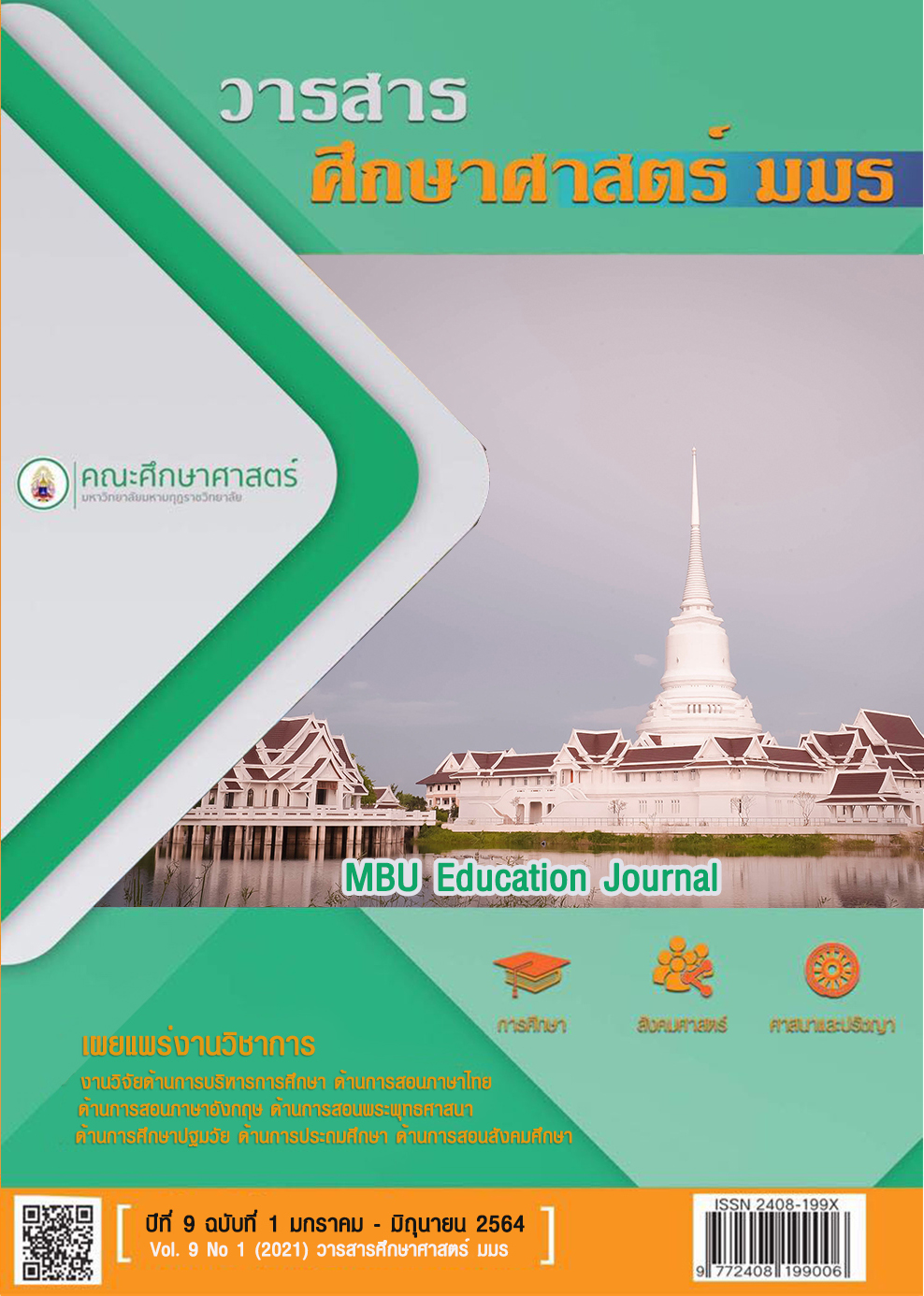STEAM EDUCATION APPROACH ON LEARNING ACHIEVEMENT, SCIENTIFIC CREATIVITY AND ATTITUDE TOWARD CHEMISTRY FOR GRADE 10 STUDENTS
Keywords:
STEAM EDUCATION APPROACH, ACHIEVEMENT, SCIENTIFIC CREATIVITY, ATTITUDE TOWARD CHEMISTRYAbstract
The purposes of this research were to study science learning achievement, scientific creativity, and attitude toward chemistry after learning with STEAM education approach. The participants were 34 tenth grade students from Piboonbumpen Demonstration School of Burapha University, who studied in the second semester of academic year 2019, selected by cluster random sampling. The research instruments consisted of ; 1) Lesson plans on the topic of covalent bond, 2) Science achievement test, 3) Scientific creativity test, and 4) Attitude towards chemistry questionnaires. The data was analyzed by t-test for dependent sample and t-test for one sample.
The results of this study indicated that:
- The posttest scores of science learning achievement of the tenth grade students after learning with STEAM education approach were higher than those before learning at the .05 significance level.
- The posttest scores of science learning achievement of the tenth grade students after learning with STEAM education approach were higher than 70 % set criterion at the .05 significance level.
- The posttest scores of scientific creativity of the tenth grade students after learning with STEAM education approach were higher than those before learning at the .05 significance level.
- The attitude towards chemistry of the tenth grade students after learning with STEAM education approach were higher than those before learning at the .05 significance level.
References
สำนักงานเลขาธิการสภาการศึกษา. (2560). แผนการศึกษาแห่งชาติ พ.ศ. 2560 – 2579. กรุงเทพฯ: พริกหวานกราฟฟิค.
จารีพร ผลมูล, เกริก ศักดิ์สุภาพ และสุนีย์ เหมะประสิทธิ์. (2558). การพัฒนาแหล่งการเรียนรู้บูรณาการแบบ STEAM สำหรับนักเรียนชั้นมัธยมศึกษาปีที่ 3 กรณีศึกษาชุมชนวังตะกอ จังหวัดชุมพร. ใน 34th The National Graduate Research Conference.
สถาบันทดสอบทางการศึกษาแห่งชาติ (องค์การมหาชน). ผลสอบ O-NET. (2561). เข้าถึงได้จาก http://www.niets.or.th/.
ฉัตรสุดา เดชศรี. ครู โรงเรียนสาธิต “พิบูลบำเพ็ญ” มหาวิทยาลัยบูรพา. (5 ตุลาคม 2560). สัมภาษณ์.
ไพฑูรย์ สินลารัตน์. (2558). ทักษะแห่งศตวรรษที่ 21 ต้องก้าวให้พ้นกับดักของตะวันตก. กรุงเทพฯ: จุฬาลงกรณ์มหาวิทยาลัย.
พิมพันธ์ เตชะคุปต์ และ พเยาว์ ยินดีสุข. (2548). วิธีการสอนวิทยาศาสตร์ทั่วไป. กรุงเทพฯ: สถาบันพัฒนาคุณภาพวิชาการ.
หัทยา โรจน์วิรัตน. (2559). ผลของการจัดการเรียนรู้ด้วยวัฏจักรการเรียนรู้ 7 ขั้น (7E) ร่วมกับเทคนิค STAD ที่มีต่อผลสัมฤทธิ์ทางการเรียน การคิดวิเคราะห์ และเจตคติ ต่อวิชาเคมี ของนักเรียนชั้นมัธยมศึกษาปีที่ 4. วิทยานิพนธ์การศึกษามหาบัณฑิต, สาขาการสอนวิทยาศาสตร์, คณะศึกษาศาสตร์, มหาวิทยาลัยบูรพา.
อารยา ควัฒน์กุล. (2558). ผลการจัดการเรียนรู้วิชาเคมี เรื่อง สารชีวโมเลกุล ด้วยการเรียนรู้โดยใช้แบบจำลองเป็นฐาน เพื่อพัฒนามโนทัศน์ทางวิทยาศาสตร์และความสามารถในการสร้างแบบจำลองทางวิทยาศาสตร์สำหรับนักเรียนชั้นมัธยมศึกษาปีที่ 6. วิทยานิพนธ์การศึกษามหาบัณฑิต, สาขาการสอนวิทยาศาสตร์, คณะศึกษาศาสตร์, มหาวิทยาลัยบูรพา.
Kim, D., & Bolger, M. (2015). Analysis of Korean Elementary Pre-Service Teachers’ Changing Attitudes About Integrated STEAM Pedagogy Through Developing Lesson Plans. International Journal of Science and Mathematics Education volume 15(4), 587–605.
Kwon, S., Nam, D., & Lee, T. (2011). The effects of convergence education based STEAM on elementary school students’ creative personality. The 19th International Conference on Computers in Education, Chiang Mai: Asia Pacific Society for Computers in Education.
Land, M. H. (2013). Full STEAM ahead: The benefits of integrating the arts in to STEM. Procedia Computer Science, 20, 547-552.
Madden, M. E., Baxter, M., Beauchamp, H., Bouchard, K., Habermas, D., Huff, M., Ladd, B., Pearon, J., & Plague, G. (2013). Rethinking STEM education: An interdisciplinary STEAM curriculum. Procedia Computer Science, 20, 541-546.
Riley, S. (2014). No Permission Required: A Guide of being STEAM to life K-12 Schools. Westminster: The Vision Board, LLC.
Riley, S. (2016). 6 Steps to creating a STEAM-centered classroom. Retrieved from https://educationcloset.com
Yakman,G. (2008). An overview of creating a model of integrative education. Retrieved form






